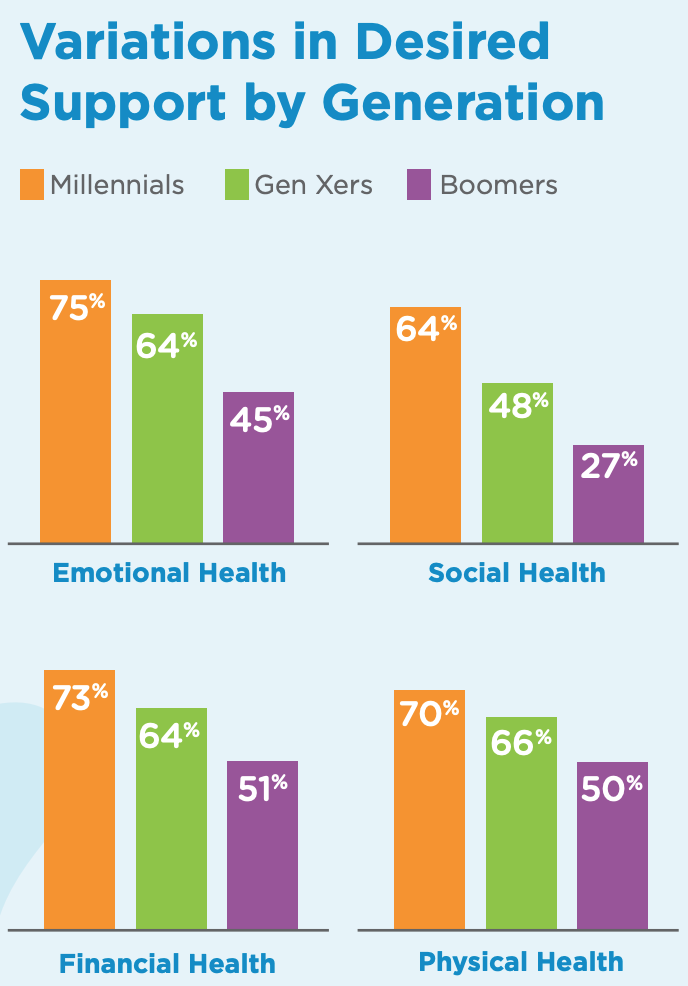At 92 million strong, millennials are the largest generation ever in the United States. They now make up the largest generation in the workplace, with one in three employees born between 1980 and 2000. This means their opinions and concerns about the workplace get mindshare with alert employers.
Changing View Of Wellness And Who Provides It

A recent survey by Welltok highlighted aspects of wellness that millennials want most from their companies. Previous generations thought about wellness as the avoidance of being sick, but for millennials, wellness is a holistic way of being that includes financial, social, emotional, and physical health. While some Baby Boomers and Gen X employees expected their companies to support employee wellness, a decisive majority of millennials look for these types of benefits.
For example, 75% of millennials expect their companies to provide support for emotional health, versus 64% and 45% of Gen Xers and Baby Boomers, respectively. Social health has the most significant disparity, with 64% of millennials wanting employer support, versus 48% and 27% of Gen Xers and Baby Boomers, respectively.
Where Are The Resources?
Even if a company offers wellness benefits, millennials may not know about them. Only 23% strongly agreed that they knew where to find resources for health and well-being. Companies that wonder if programming or participation is the issue should consider if communication is lacking.
What Matters Most To Millennials
When asked what the top-ranked health and well-being priorities were, millennials provided the following ranking:
- Financial stability
- Positive relationships at home and work
- Healthy eating habits
- Appropriate level of physical activity
- Manageable stress level
- Adequate sleep
- Higher purpose
- Health condition management
Although stress levels fall in the middle of this ranking, 44% of millennials in the survey said that stress negatively affects their lives. Even more concerning, 51% said they are considering changing jobs because of it. Nearly three in four people surveyed (73%) said they think the employers should be responsible for managing or reducing stress. Keep in mind that this responsibility might go beyond specific wellness offerings to incorporate employer expectations and culture. With millennials expecting employer involvement in stress management, companies that are successful in providing that support may have an easier time with recruiting and retention.
Cookie Cutter Approach To Wellness Ineffective
A one size fits all wellness offering does not interest millennials. Sixty percent felt companies offered everyone the same resources, and 62% said their companies provided irrelevant resources. This mismatch indicates that employers are not paying attention to what their specific employee populations crave. Most millennials (85%) said they would participate if companies offered more valuable benefits, so if they have the right choices, they will take advantage of them.
Most Desired Incentives
We’ve seen in previous studies that the benefit employees want most is free time. This study reinforces that finding. Millennials said they would be most motivated by having extra vacation time (64%) and flexible schedules (53%), as well as wellness benefits (56%).

Millennials also reported that incentives like charity donations, commuter benefits, lunch with company leadership, and volunteer time were less attractive.
The wellness needs and expectations of a workforce can change. As they do, companies need to pay attention to those dynamics and adjust their offerings to keep their programs relevant, supportive, and motivating.












